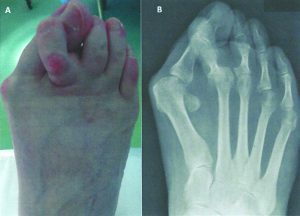 Foot pain is one of the most common complaints patients have. Unfortunately, many people wait until their symptoms are elevated to a level that causes extreme discomfort and complications.
Foot pain is one of the most common complaints patients have. Unfortunately, many people wait until their symptoms are elevated to a level that causes extreme discomfort and complications.
One of the common foot disorders is crossover toe, which causes the toes to drift and overlap each other. It can happen to any of the toes but usually occurs in the second toe, causing it to float towards the big toe and eventually dislocates from the joint causing severe pain. After this stage of damage, the toe cannot be put back into place without surgery.
Causes
Usually, crossover toe is caused by biomechanics; for example, when the ball of the foot undergoes extensive pressure and weight bearing, because of a long 2nd metatarsal, it causes a weakening of the joint, which after time causes dislocation of the toe altogether. At this point, the 2nd metatarsal will physically lay over the big toe. In some cases, crossover toe can be caused by injury. This is usually seen in individuals that wear tight shoes, high heels, or shoes with little support. The symptoms are buckling of the toe, crooked toes, pain, swelling and difficulty wearing shoes or standing for extended periods of time.
Treatment Options and Surgery
It is always best to treat crossover toe in its early stages. The typical treatment would be resting the foot, applying ice, stretching exercises, taking oral anti-inflammatory medications, splinting or taping the toes into the correct position, orthopedic shoes and or inserts, and cortisone injections. The last result is surgery, and that is almost always necessary if the symptoms have been ignored for too long.
Surgery involves removing a portion of the bone at the joint and relocating the toe at the ball of the foot into the proper position. Patients usually recover within six weeks to three months depending on the severity of the deformity and whether or not additional bunion surgery was performed consecutively.
At Collier Podiatry, Dr. Petrocelli is highly experienced in treating foot disorders and deformities like crossover toes and the symptoms that go along with foot pain and discomfort before and after surgery. Collier Podiatry offers great options and routines for the most beneficial rehabilitation and healing.
The caring, supportive staff at Collier Podiatry is available to answer your questions and make your appointment. Please visit their website at www.collierpodiatry.com, or call them direct at (239) 775-0019.
Collier Podiatry
NCH Countryside Commons
1715 Heritage Trail, Suite 204
Naples, FL 34112
Phone: (239) 775-0019
Fax: (239) 775-0219
Email: CollierAppointments@gmail.com









